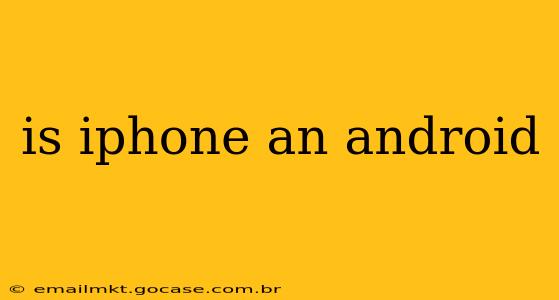No, an iPhone is not an Android. This is a fundamental distinction in the mobile phone world. The confusion might arise from both being smartphones, but they operate on entirely different operating systems and are manufactured by different companies. Let's break down the key differences.
What is an iPhone?
An iPhone is a smartphone designed and manufactured by Apple Inc. It runs on iOS, Apple's proprietary mobile operating system. This operating system is known for its user-friendly interface, strong security features, and tight integration with other Apple products like Macs and iPads. Apple controls the entire ecosystem, from hardware to software, leading to a highly integrated and controlled experience.
What is an Android?
An Android is a mobile operating system developed by Google. Unlike iOS, Android is an open-source platform, meaning that various manufacturers can license it and use it on their own devices. This leads to a wide variety of Android phones from different brands like Samsung, Google (Pixel phones), OnePlus, Xiaomi, and many others, each with its unique features and designs. The Android operating system is known for its flexibility, customization options, and open-source nature.
Key Differences Between iOS and Android
The core difference lies in their operating systems:
- Operating System: iPhone uses iOS; Android devices use Android.
- Manufacturer: iPhones are made by Apple; Android phones are made by various manufacturers.
- App Stores: iPhones use the App Store; Android phones use the Google Play Store. While many apps are available on both platforms, there are some exclusive apps for each ecosystem.
- Customization: iOS offers a more streamlined and less customizable experience compared to Android, which allows for extensive personalization of the home screen, widgets, and other aspects.
- Hardware Integration: Apple's tight control over both hardware and software in iPhones ensures seamless integration and a consistent experience across all devices. Android devices, due to their diverse manufacturers, can have varying hardware and software experiences.
What are the advantages of iPhones?
- User-friendly interface: iOS is generally considered very intuitive and easy to use, even for beginners.
- Strong security: Apple has a robust reputation for security and privacy.
- Seamless ecosystem integration: Works seamlessly with other Apple devices.
- High-quality apps: The App Store is known for its rigorous app review process, resulting in generally high-quality apps.
What are the advantages of Android?
- Customization options: Android offers extensive customization options, allowing users to personalize their devices extensively.
- Variety of devices: A wide range of Android devices are available at various price points and with different features.
- Open-source nature: The open-source nature allows for greater flexibility and development opportunities.
Are there any similarities?
Both iPhones and Android phones are smartphones that offer similar core functionalities: calling, texting, internet access, app usage, photography, and more. However, their underlying operating systems, the user experience, and their overall ecosystem are fundamentally different.
In conclusion, the simple answer is no, an iPhone is not an Android. They are distinct products with different operating systems, manufacturers, and user experiences. The best choice for you depends on your personal preferences and priorities.
